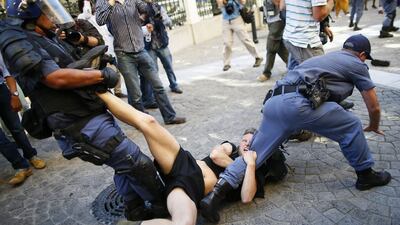South Africa’s prolonged state of crisis has been compounded by recent economic decisions and the looming certainty of a hike in US Federal Reserve interest rates. Last week, president Jacob Zuma sacked the country’s finance minister, Nhlanhla Nene, causing panic among many investors. The surprise sacking came on the heels of Standard & Poor’s downgrade of the country’s credit rating to BBB-, or one notch above junk status. Unsurprisingly, the South African rand is currently trading at record lows.
To make matters worse, the Fed will likely raise interest rates for the first time in nearly a decade later this week. This is bad news for emerging market economies like Turkey and Brazil, which have all pegged their short-and long-term economic futures on the cheap money low interest rates facilitate.
Mismanagement of the economy is the real culprit for the vulnerability of emerging markets and there will be serious political ramifications in 2016 as a result. Current events in South Africa, therefore, provide both an example of what could unfold across this sector and a dire warning about the need for political reform in countries such as Brazil and Turkey.
While the African National Congress (ANC) delivered South Africa from the cruel grip of the apartheid government, its recent attempts at running the country under Mr Zuma have demonstrated the party’s inability to govern and, perhaps more importantly, reform from within. ANC veterans have repeatedly failed to demand internal reform in the face of Mr Zuma’s recklessness, often for fear of banishment from the party. The sort of cronyism common in Robert Mugabe’s Zimbabwe is starting to flourish in Pretoria.
The dismissal of the finance minister last week is an illustration of this situation. Widely respected and only two years into his term, Mr Nene’s sacking hasn’t yet been fully explained by the president’s office.
Some have speculated that the minister was asking uncomfortable questions about the running of the country’s finances, including his blocking of a restructuring deal between the national carrier South African Airways and airline manufacturer Airbus. Others have suggested that the removal is Mr Zuma’s way of controlling new appointments in the African regional centre of the Brics Bank.
Mr Nene’s replacement, David Van Rooyen, is a relative unknown with little to no experience in international finance. The Mail & Guardian, a Johannesburg weekly paper, called into question his ability to tame an economy in the midst of a crisis.
While Mr Van Rooyen’s finance experience is far from developed, his credentials as an ANC stalwart are uncontested. In the 1980s, he was a student activist and a member of the military wing of the ANC.
The appointment of candidates with little experience but proven allegiance as ANC party functionaries is one way Mr Zuma maintains strict control over the levers of power and temper his political vulnerability. Even if the majority of South Africans were to decide that Mr Zuma is unfit to govern, the power to remove him from office ultimately lies in the ANC’s 96-member national executive committee, most of whom were directly appointed by him. If they turn against him, they risk losing their jobs.
There are some leading ANC members ready to challenge Mr Zuma’s rule. Veteran ANC member Barbara Hogan, who spent nine years in prison for treason under the apartheid regime, summed up the political environment succinctly last Friday in Cape Town.
“Ordinary citizens must rise up and say enough is enough. The majority do not have enough to survive. Corruption robs them. Our institutions that were meant to protect us are being destroyed slowly, slowly, slowly.”
Her calls for action are not falling on deaf ears. In February, tens of thousands of South Africans took to the streets to protest rising university fees. Earlier this year, thousands of students protested at the University of Cape Town for the removal of a statue of the British colonialist Cecil Rhodes. The generation of South Africans born free of apartheid’s bondage are coming alive and embracing their task to build the country into one that the founding members of the ANC would welcome.
In this climate, political upheaval in some capacity seems unavoidable. Mr Zuma has shown a stubborn unwillingness to embrace criticism and reform in a similar manner to other emerging market leaders such as Turkish president Recep Tayyip Erdogan. Street clashes and unrest will be one of the only options left for disgruntled voters as the economy takes hits from Fed rate hikes, which could continue throughout 2016.
These problems are not confined to South Africa. In Brazil, there are moves towards impeachment of president Dilma Rousseff, who has become isolated from her traditionally leftist base as her government has pursued neoliberal economic policies to revive the country’s stalled economy and boost investor confidence.
In Turkey, the political situation is far from settled, with the ever-present ISIL menace just over the border in Syria, the continuing war against Kurdish PKK militants, and Ankara’s recent dispatch of Turkish troops to Iraq without Baghdad’s approval.
As global markets end 2015 on a sombre note, driven by a lack of investor confidence and shifting commodity prices, political uncertainty is the only constant in emerging markets. After all, the upheaval has already started in southern Africa.
jdana@thenational.ae

